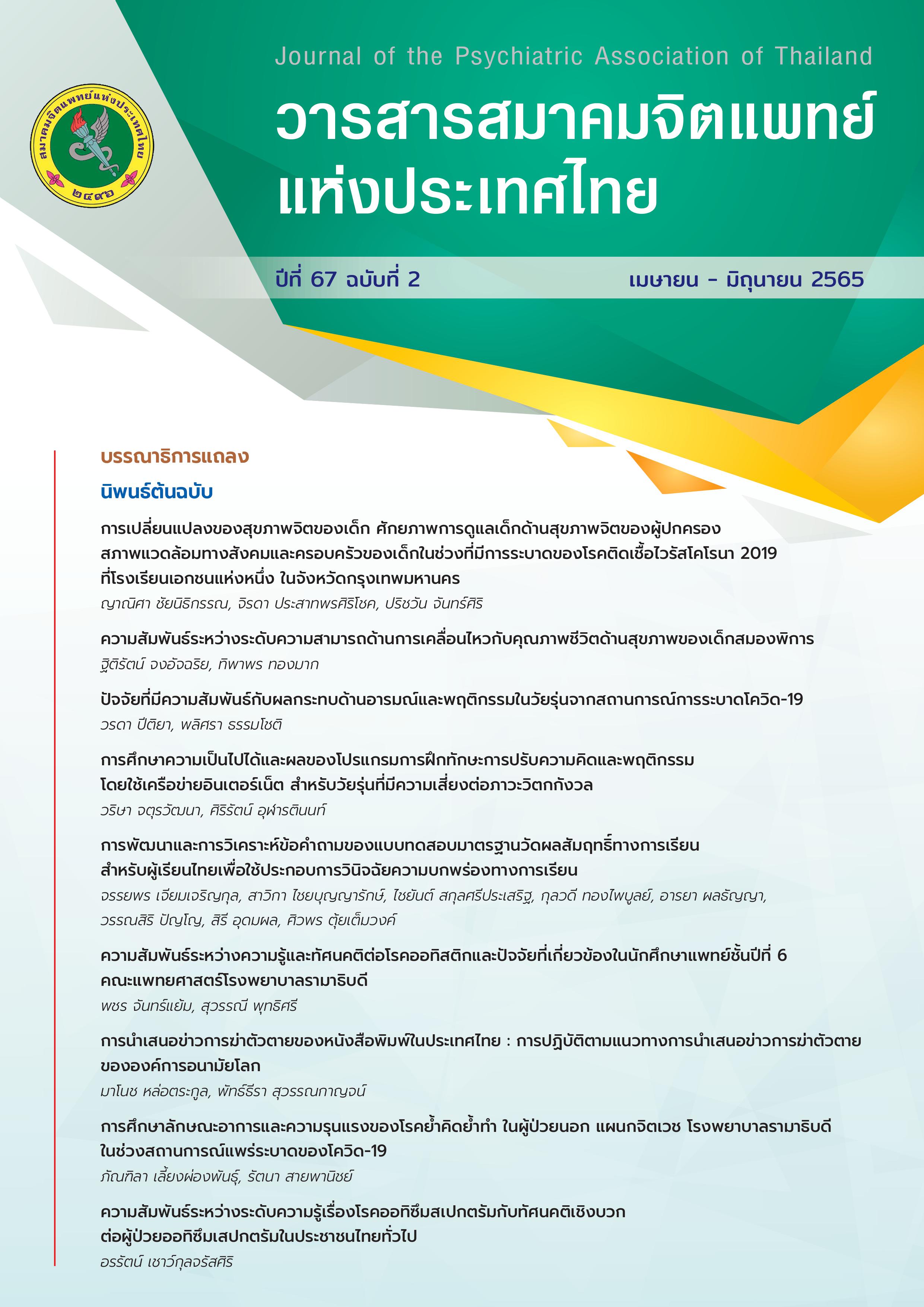The The Association Between Knowledge and Positive Attitudes Towards Autism Spectrum Patients in Thai Population
Main Article Content
Abstract
Objective: To find the association between the knowledge of Autism spectrum disorder and the positive attitude toward Autism patients in Thai general population.
Methods: This research was a secondary analysis study from “The internet survey of knowledge and attitude toward Autism spectrum disorder in Thai population”. Samples were 1,203 Thai volunteers who responded the questionnaire. Both knowledge of Autism spectrum disorder and positive attitude toward the patient were measured by the validated questionnaires. The results were analyzed by Chi-square and Spearman Rank Correlation tests.
Results: Of 1,203 participants, the mean age was 35.9 ± 10.2 years, with 86.7% female. The mean score of the knowledge of Autism spectrum disorder was at 10.6 +- 2.6, with all categorical knowledge (causes, symptoms, treatment and prognosis) were ranked in good level. The average score of positive attitudes toward autism patients was at 44.9 +- 5.6. Chi square test showed that the participants group with higher knowledge had more positive attitude toward autism patients than the lower knowledge group, with statistical significance (p-value < 0.1). Spearman Rank Correlation test found that the score of knowledge, in all categories, were positively correlated to the score of positive attitudes toward autism patients, with statistical significance (p-value < 0.1).
Conclusion: The accurate knowledge of Autism spectrum disorder, in all aspects, is associated with the positive attitude towards autism patients in individuals. Thus, introducing the accurate knowledge about Autism spectrum disorder to public awareness could lead to better perspective among the autism patients in Thai society.
Article Details

This work is licensed under a Creative Commons Attribution-NonCommercial-NoDerivatives 4.0 International License.
Articles submitted for consideration must not have been previously published or accepted for publication in any other journal, and must not be under review by any other journal.
References
Park HR, Lee JM, Moon HE, Lee DS, Kim B-N, Kim J, et al. A short review on the current understanding of autism spectrum disorders. Exp Neurobiol 2016;25(1):1-13.
Lai M-CD, Lombardo MVP, Baron-Cohen SP. Autism. Lancet (British edition) 2014;383(9920):896-910.
Baumer N, Spence SJ. Evaluation and management of the child with autism spectrum disorder. Continuum (Minneap Minn) 2018;24(1, Child Neurology):248-75.
Simonoff E, Kent R, Stringer D, Lord C, Briskman J, Lukito S, et al. Trajectories in symptoms of autism and cognitive ability in autism from childhood to adult life: Findings from a longitudinal epidemiological cohort. J Am Acad Child Adolesc Psychiatry 2020;59(12):1342-52.
National Statistical Office of Thailand. The prevalence of Autistic in Thai general population, [Internet]. 2020 [cited 2021 February 25]. Available from: http://statv2.nic.go.th/Health/05020203_06.php
Ganz ML. The lifetime distribution of the incremental societal costs of autism. Arch Pediatr Adolesc Med 2007;161(4):343-9.
Atiipanyawong, K. Attitude of being Peers of Autistic students in integration classroom in Chitralada Primary School (dissertation). MSc of Psychology Thesis. Chulalongkorn University; 2013.
Kuzminski R, Netto J, Wilson J, Falkmer T, Chamberlain A, Falkmer M. Linking knowledge and attitudes: Determining neurotypical knowledge about and attitudes towards autism. PLoS One 2019;14(7):e0220197.
Gemegah E, Hartas D, Totsika V. Public attitudes to people with ASD: contact, knowledge and ethnicity. Advances in Autism. 2020;ahead-of-print(ahead-of-print).
Au TC, Lau NS. Private music teachers’ knowledge of and attitudes toward students with autism spectrum disorder. J Autism Dev Disord 2021;51(12):4551-9.
Someki F, Torii M, Brooks PJ, Koeda T, Gillespie-Lynch K. Stigma associated with autism among college students in Japan and the United States: An online training study. Res Dev Disabil 2018;76:88-98.
Lindblom A, Dindar K, Soan S, Kärnä E, Roos C, Carew MT. Predictors and mediators of European student teacher attitudes toward autism spectrum disorder. Teach Teach Educ 2020;89:102993.
Van ‘t Hof M, Van Berckelaer-Onnes I, Deen M, Neukerk MC, Bannink R, Daniels AM, et al. Novel insights into autism knowledge and stigmatizing attitudes toward mental illness in Dutch youth and family center physicians. Community Ment Health J 2020;56(7):1318-30.
Mac Cárthaigh S, López B. Factually based autism awareness campaigns may not always be effective in changing attitudes towards autism: Evidence from British and South Korean nursing students. Autism 2020;24(5):1177-90.
White D, Hillier A, Frye A, Makrez E. College students’ knowledge and attitudes towards students on the autism spectrum. J Autism
Dev Disord 2019;49(7):2699-705.
Choukuljaratsiri O. The first internet survey of knowledge, attitudes towards Autism in Thai general population. Poster session presented at: American Psychiatric Association 172nd annual meeting; 2019 May 18-22; San Francisco, US.
Jatchavala C. Discourse and stigmatization of psychiatric disorder in Thailand. J Sociol Anthropol 2013;32:93-113.
Chandran H, Jayanthi K, Prabavathy S, Renuka K, Bhargavan R. Effectiveness of video assisted teaching on knowledge, attitude and practice among primary caregivers of children with Autism Spectrum Disorder. Adv Autism 2019;5(4):231-42.
Cochran, W. G. Sampling Techniques. 3rd Edition. New York: John Wiley; 1977.
Adiukwu F, de Filippis R, Orsolini L, Gashi Bytyçi D, Shoib S, Ransing R, et al. Scaling up global mental health services during the COVID-19 pandemic and beyond. Psychiatr Serv 2021: appips202000774.


